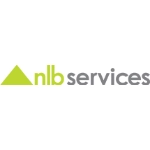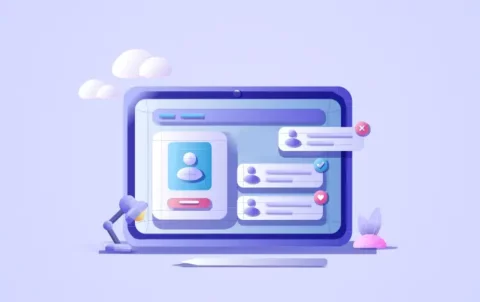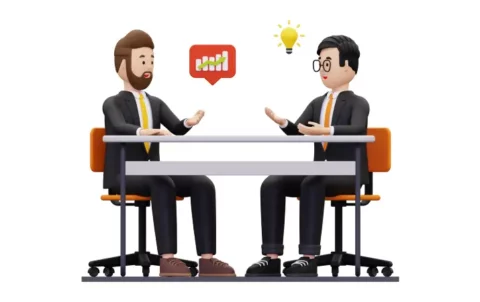© 2026 Next Level Business Services Inc. All Rights Reserved.
How to Accept an Offer Letter: Mail Acceptance and Do’s and Don’ts
By NLB Services
Finally, you have received the job offer you have worked so hard for. You celebrate with your friends and family, but you may soon find yourself in an unfamiliar situation. How to leave a job on good terms? Or how should you write an offer letter acceptance email? You may also be wondering how to prepare for the new role – the questions and inhibitions can be endless. We’ve outlined the best practices to take before you start a new job, covering a range of queries to help you decide the best course of action.
Express Gratitude and Acceptance
The first thing to do as you receive an offer letter is to send a thank you email to the interviewer, expressing gratitude and zeal for getting on board. In addition to demonstrating your professionalism, sending an email accepting the offer makes a good first impression on the recipient, whilst also providing clarifications for any confusion, addressing your inquiries, and eliminating any remaining doubts. In case you’re wondering how to accept your offer letter or what details to include in your offer letter email, don’t worry, we’ve got you covered. You can write an acceptance email in several different ways. We have formulated a sample email for the reference of our readers.
Subject: Offer Letter Acceptance Email – [Your Name]
Dear [Hiring Manager’s Name],
I hope you are doing well. I’m writing this email to officially accept the employment offer from [Company’s Name] for the position of [Employment Title]. I am ecstatic and honored to have gotten this opportunity to work for your prestigious company.
I would like to extend my deepest gratitude to you and the entire hiring team for considering me for this position. I am genuinely excited about the idea of using my abilities and expertise to help the company succeed. After giving due thought and evaluation I am certain that accepting the offer is the best course of action for my growth.
I have reviewed the offer letter from my end and hereby concur with the terms of the salary, perks, start date, and any other relevant information as detailed. I hereby request you share any relevant papers, contracts, or onboarding material required to complete the pre-employment screenings and documentation at the earliest. If there are any further formalities I need to complete before the joining date, please let me know.
Looking forward to hearing from you.
Kinds regards,
(Your Name)
Do’s and Don’t of Acceptance Letter
| Do’s | Don’ts |
|---|---|
| Express Gratitude: Begin with a thank-you statement expressing appreciation for the offer. | Delay Unnecessarily: Avoid long delays in responding, as it may be perceived as disinterest. |
| Confirm Details: Clearly state your acceptance and reiterate key employment terms such as position, start date, and salary. | Negotiate Terms Already Agreed Upon: Don’t renegotiate terms unless absolutely necessary, as this can come across as unprofessional. |
| Professional Tone: Maintain a professional and courteous tone throughout the email. | Use Casual Language: Avoid overly casual or informal language, emoticons, or slang. |
| Ask Questions: Politely ask any clarifying questions about the role or next steps. | Assume Details: Don’t make assumptions about the role or terms not clearly stated in the offer. |
| Proofread: Carefully proofread your email for spelling and grammatical errors. | Overlook Errors: Don’t send the email without checking for mistakes; it reflects on your attention to detail. |
| Confirm Receipt: If you haven’t heard back, follow up to confirm receipt of your acceptance. | Bombard With Emails: Don’t send multiple follow-ups in a short period; give them time to respond. |
Reviewing and Understanding the Employment Agreement
It is rather common to get carried away with the excitement of accepting a new job offer and speeding through the employment contract. But we strongly suggest that you take your time to go through it. It is a legally binding document that should be meticulously reviewed to avoid any implications or misunderstandings in the future. An employment agreement essentially outlines the terms and conditions of employment between an employer and an employee, providing legal protection for both parties involved. Before signing, take key note of the duration of the employment, salary and related perks, job role and responsibilities, working hours, leave obligations, and other relevant information to ensure the terms laid out are in alignment with the job offer you received. It’s rather crucial to assess restrictive covenant clauses about confidentiality, non-solicitation, non-compete, and intellectual property rights. Focusing on restrictive covenant clauses is especially important as it can greatly impact your future career goals and professional mobility. For instance, you can be forbidden from working for a competitor company for a specific duration. It is therefore acceptable to request modifications or negotiate terms where required to strike a fair balance between safeguarding the employer’s legitimate interests whilst protecting your professional opportunities. Additionally, take cognizance of the termination terms, such as notice period requirements and termination grounds. Lastly, the legal ramifications of the agreement and any unclear or unfavorable clauses can be better understood by seeking the help of a corporate lawyer.
Planning Your Notice Period
Transferring from one job to another smoothly requires careful planning of your notice period. It entails evaluating an appropriate length of time to inform your employer of your departure, along with having discussions with them regarding the transition process. Typically notice period for a resignation can range from anywhere between two months to a couple of weeks, depending on the agreed time frame in the employment contract. Although the sooner you do it the better it is, giving your employer enough time to find a replacement if needed. If you’re unsure, it’s best to reach out to your HR department to avoid any legal repercussions. You should also have an open discussion with your supervisor regarding your role and responsibilities during the transition process as you might have to offer assistance by providing training to your co-workers or a new employee taking over your role.
Preparing for the New Role
As you begin to gear up for your new job you must familiarize yourself with the company thoroughly. Research the company’s background, looking into its products or services, USP, mission, annual reports, and financial statements to have a well-rounded understanding of its financial situation, growth prospects, operational efficiency, and long-term goals. Update yourself on the industry the company is operating in to learn about the key competitors, ongoing trends, and the difficulties the sector may be encountering. By doing so you can identify any possible challenges or growth opportunities for the company in the future. Think about how your skills and experience can contribute to overcoming those challenges and leveraging those opportunities. You can also review the company’s social media handles to learn about any latest updates or announcements. These platforms provide a good sense of a company’s working culture giving insight into any employee-centric activities they may be conducting. Additionally, LinkedIn can be a very helpful tool to learn about your colleagues and their relevant expertise and achievements, thereby allowing for better engagement and rapport building. Overall, learning about the company before you start can exemplify enthusiasm and keenness in getting on board, demonstrating to your employer that you want to get off to the best start and be productive right away. Don’t forget that you may have been chosen because of your previous achievements and experiences, but your success in the company is purely dependent on how well you understand and adapt to your new environment – for which thorough research is a prerequisite.
Taking care of personal matters
Before you start your job it’s important to tend to any logistic issues like moving locations or look after other personal matters. Dealing with these issues beforehand enables you to concentrate on establishing a lucrative career as you begin your new employment with a clear head, making room for a seamless transition. When moving locations, you have to delve into careful planning taking into account several factors like financial implications, commute time and costs, housing deposits, and social elements. It’s also advisable to look into how far away you are from family and friends whilst also evaluating other amenities, like health care facilities, schools or universities for ongoing learning and education for children, and other aspects that enhance your quality of life. Planning permits you with enough time to make a well-thought decision while also allowing you to settle in and get used to your new surroundings. Remember, to take advantage of the break you’re taking before beginning your new job, even if it’s just a couple of days. When coping with the stress of adjusting to a new work environment, you will thank yourself for making the effort to manage your life beforehand, avoiding any additional stress.
Conclusion
Indeed, beginning a new job can be a turning point in one’s career. So why wouldn’t you want to take advantage of this opportunity? We understand that starting a new job is exciting, but it can also be incredibly stressful. Preparing in advance will help you deal with a lot of the nervousness and anxieties you might be feeling, giving you a strong start straight away. With all the steps we have mentioned you can be assured of making the best moves to prepare for the role, putting your best foot forward.
Talent Solutions








